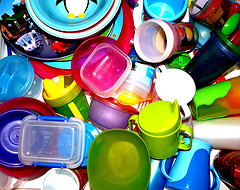How to Handle the Overload of Plastic in Your Kitchen
 The use of plastics in the kitchen is ringing more and more warning bells among environment- and health-conscious folks these days. Items like plastic bags, dishes, food storage containers, and baby bottles add to landfills and may leach dangerous chemicals. But short of dumping all your plastic utensils in the trash, what can you do? Here's how to reduce your consumption of new plastic and find safer ways to handle the plastic you already.
The use of plastics in the kitchen is ringing more and more warning bells among environment- and health-conscious folks these days. Items like plastic bags, dishes, food storage containers, and baby bottles add to landfills and may leach dangerous chemicals. But short of dumping all your plastic utensils in the trash, what can you do? Here's how to reduce your consumption of new plastic and find safer ways to handle the plastic you already.
Do what you can, when you can is a good guideline when going greener or making any other life change. Reducing your usage of plastic by even 20 percent is a positive step.
Refuse. Plastic Pollution Coalition, an organization aimed at helping reduce every individual’s plastic footprint, has added to the 3 R’s of eco-consciousness to read: “Refuse, Reduce, Reuse, Recycle.” Refusal to bring new items such as plastic shopping bags and beverage bottles into your home is a small change which has a big impact on the health of your family and of the planet. (Taking your own reusable cloth totes to the grocery store will reduce your plastic consumption by literally hundreds of bags per year.)
Remember the good old days. You, your parents, or grandparents, depending on your age, can remember a time not so long ago without ubiquitous plastic products. Back in those days, people wiped up food spills with washable dishcloths instead of synthetic sponges and wrapped sandwiches in waxed paper or cellophane (which is totally biodegradable) rather than plastic cling film. Follow their example to reduce your plastic usage.
Be a conscious consumer. Notice all the sneaky sources of plastic in your regular routine (for example, even if you refuse plastic check-out bags at your supermarket, you still are confronted with yet more bags in the fruit and vegetable department) and find alternatives. Does the one cabbage you’re buying really need to be bagged before weighing? Can you use your own stainless steel to-go mug at your favorite coffee shop?
Replace plastic with healthier options as needed. When it’s time for a new cutting board, opt for hardwood or bamboo. If you’re an omnivore, for food safety’s sake keep a separate board on hand – to be used only with raw meat, poultry, and fish. Need containers for staples like flour or legumes? Glass is excellent, and there are lots of recyclable jars in convenient sizes … or pick up cute retro enameled metal canisters at a garage sale. Make sure they have tight-fitting lids and keep them away from heat sources to avoid infestation.
Handle your plastics wisely. If you're not prepared to purge your kitchen of all usable plastics, familiarize yourself with plastic health and safety tips. Do not bring polyvinyl chloride (type #3), polystyrene (#6), or polycarbonate (in the #7 category) into contact with food, as they leach harmful chemicals. As for other types of plastic, avoid subjecting them to high heat, microwaving, or acidic preparations. Hand wash to avoid harsh detergents and excessive wear and tear. Repurpose any plastics that show signs of deterioration.
Keep old plastic out of landfills. Worn plastic may be recycled for use in making such things as outdoor furniture. Or repurpose it yourself for non-food storage. For instance, a used plastic cup could hold pens on the desk of your home office and a sandwich holder could be decorated as a reusable gift box.
Garden. Planting a vegetable garden is a fantastic way to reduce your plastic footprint – your homegrown produce is guaranteed not to come packaged in plastic! Another benefit is the fact that local organic veggies are more healthful and tasty than the alternative. If you live in a northern state such as Massachusetts with a limited growing season, canning the bounty reaped from your Boston garden (in glass jars, of course!) will give you nutrition and flavor all year round.
Laura Firszt writes for networx.com.
Related Articles
Looking for a Pro? Call us (866) 441-6648

Landscaping Average Costs
Landscapers Experiences

Find A Reliable Full Service Crew For No-Fuss Tree Removal

Hiring A Great Landscaper Was Almost Too Easy, Even Long Distance



